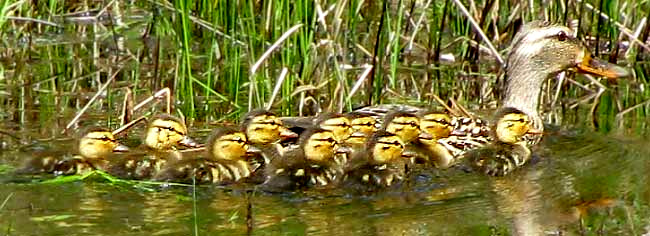Excerpts from Jim Conrad's
Naturalist Newsletter

from the the September 13, 2009 Newsletter, issued from the Siskiyou Mountains west of Grants Pass, Oregon:
MOLTING MALLARDS
The pond's Great-blue Heron and Belted Kingfisher of recent Newsletters have wandered on, but this week four Mallards turned up, and you can see them above.
Probably you can figure out that that's a male on the left and a female on the right, but who's that in the middle?
If you catch the slight hint of greenness in the middle one's head you can guess that it's an immature male. Also notice that nothing of the female's heavy brown mottling shows on the center one, for adult males lack such mottling.
The adult drake's head also is a little ratty looking, probably because of molting.
By the way, notice how shallow the pond is getting, with grasslike vegetation poking above the water's surface. The ducks are actually in its deepest part. Some years the pond completely dries up, but my friends expect the rains to return before that happens this year.

from the the May 24, 2009 Newsletter, issued from the Siskiyou Mountains west of Grants Pass, Oregon:
ELEVEN DUCKLINGS
Tuesday morning a mother Mallard duck, ANAS PLATYRHYNCHOS, appeared at the pond right above my trailer followed by eleven attentive little puffballs not much larger than the eggs they'd just hatched from. You can see the whole family above.
When I first visited the pond back in mid April I saw the male and female half-hidden in tall grass at the pond's edge, stretching their necks high watching me, then when I got too close they exploded into the air. Since then I've heard them more than seen them, especially quacking at dusk. I've consciously avoided visiting where I suspected their nest to be, and I've been waiting for exactly what I saw Tuesday morning.
Eleven ducklings: That's a little larger family than normal. At the wonderful Birds-by-Bent Mallard page at http://www.birdsbybent.com/ch1-10/mallard.htm I read that Mallards normally lay eight to twelve eggs, sometimes as many as 15, and that incubation, which is performed wholly by the female, lasts from 23 to 29 days, usually 26.
My first thought seeing the ducklings was, "How many will survive?" Obviously Mallard duckling mortality rate is high, else average clutch size wouldn't be so large. The pond holds only small fish but there are many turtles and very large bullfrogs. By the way, those bullfrogs right now are harumping at their loudest all through the day. Can you imagine being a tiny duckling in a brave new world of water, mud and tall grass, with those bellowing harumps exploding all around you as you struggle to keep up with Mama? No wonder each duckling in the picture looks so wide-eyed and alert.
Thursday morning while getting my campfire going I heard the mama duck quacking continuously and I could tell that something was wrong. It wasn't that I understand duck language; there's simply a continuum of emotionality and perception modes spanning the spectrum of higher living animals, and there's much that all us animals share in common. I found the mama alone in the middle of the pond, quacking exactly as I would quack if I had to express a great personal tragedy in terms of quacks.
Fresh fox poop lay in the center of the road alongside the pond, but also there are housecats in the area. Quacking pitifully the mama duck paddled along the banks searching intently the tall grass.
In mid morning suddenly the quacking became much louder and changed in emotional content. I found her being very closely followed by a single earnest-looking little. By mid-afternoon that duckling had disappeared again, and no further duckling ever turned up.
I read that while female Mallards tend to their one brood of the year the drakes gather in small flocks, molt into eclipse plumage and hide among the rushes in sloughs where they spend the summer in seclusion. However, it must be more complex than that. Thursday afternoon the drake suddenly reappeared accompanying the female as she continued working the pond's banks looking into the grass, and he's still with her today, Sunday, though they've both stopped searching the tall grass.